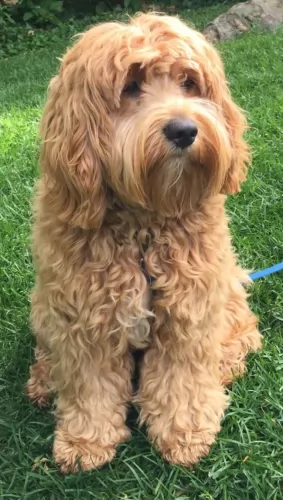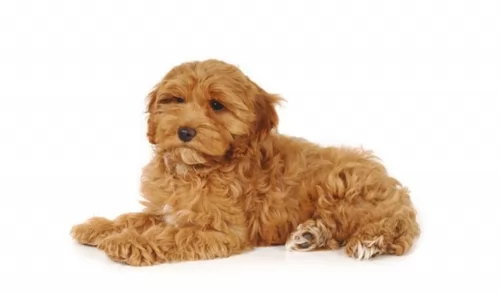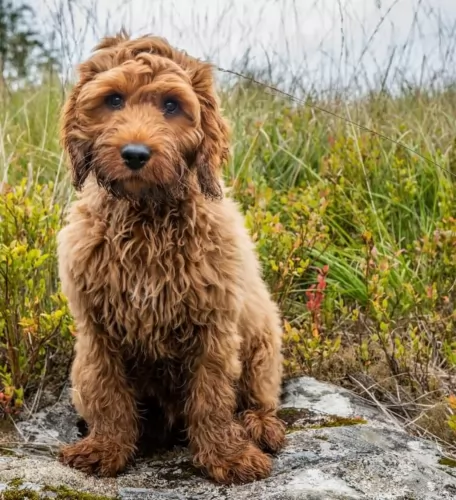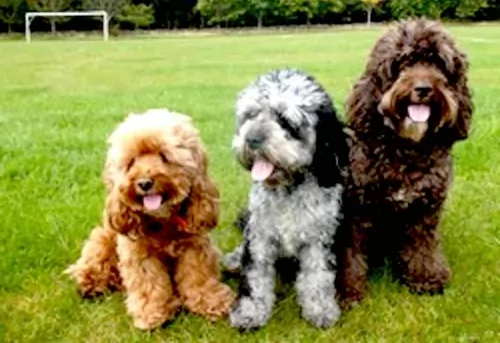 Petzlover
PetzloverBisben is originated from India but Cockapoo is originated from United States. Bisben may grow 38 cm / 15 inches higher than Cockapoo. Bisben may weigh 44 kg / 98 pounds more than Cockapoo. Both Bisben and Cockapoo has same life span. Bisben may have more litter size than Cockapoo. Bisben requires Low Maintenance. But Cockapoo requires Moderate Maintenance
There is a lot of mystery surrounding this large herding dog said to come out of the Himalaya Mountains of Asia. The belief is that sheepdogs were crossed with wolves toward the end of the 18th century, but his origin is basically unknown. They are both herding dogs and guard dogs. Others theorize that rather than a wolf, the breed arose from the Mastif family. Still others claim that the Bisben is not a breed at all but rather a “landrace”. A landrace is an animal group that is only found to exist in the local area or is bred locally for a specific reason, while a breed is developed intentionally and from a select purebred with pedigree. The Bisben may be a landrace since it is very popular in India but hardly known anywhere else. What is known is that the Brisben was in existence at the end of the 1700’s and its job was to protect and herd livestock. There are three main theories about the origin of the Bisben. They are, in no particular order:
1. The Bisben was developed by mixing several different Himalayan and Indian Sheepdogs with wolves. The wolf population in the Himalayas and in India live in very close proximity to dogs and people and this population is quite large. These Tibetan and Indian wolves are known to be smaller, more comfortable with people and less aggressive than wolves from other parts of the world.
2. The Bisben was developed by mixing local sheep herding dogs with the Tibetan Mastiff. This gave the breed its protective nature and its large size according to this theory.
3. The Bisben was developed by mixing local dogs with the ones the British, Portuguese and French imported to the India subcontinent.
There is a fourth theory as well and it combines all three of these, supposing that the Bisben is a product of crossing local dogs with wolves, Tibetan Mastiffs and European dogs.
Regardless of their origins, the Bisben grew into one of the most respected animals in the Southern Himalayas. Their assistance to the shepherds of the area was unquestioned and irreplaceable. They were touch enough to herd flocks of goats or sheep across several treacherous and unstable mountain passes. The environment in which these dogs worked when herding is one of the harshest environments on the face of the earth. Temperatures were dangerously cold, altitudes dangerously high and the terrain just plain dangerous. Many deadly large predators live there as well. This included tigers, Asiatic black bears, golden eagles, Himalayan brown bears, snow leopards, fox, dholes, wolves, and small cats. The Bisben had to be able to fight off all of these predators. In addition to these herding and protecting duties, the Bisben was also known throughout the region as an excellent hunting dog. They are capable to this day of hunting large prey such as antelope or deer. They are equally comfortable hunting alone or in a pack. He has grown into one of the most popular hunting dogs in all of India.
The Himalayas, being so rugged and treacherous, were inaccessible to most of India for many centuries and the Brisben was unknown as well. Through the British imperialist expansion across all of the Indian subcontinent, the lowlands people were connected to the highlands and mountain people for the first time. This also meant that the Brisben was no longer unknown. The entire country began to appreciate the dog for its protection and herding of livestock, as well as a companion animal who would protect its owner and family as well. As India continues to grow the popularity of the Brisben grows as well and its numbers increase regularly. The breed, if it is a breed, remains an Indian secret. They have migrated to the countries around India, but their number are small. It is only in India that they are revered and prosper. They are not present in any great numbers in Europe, North America, Japan, or most of Asia.
Whether or not the Bisben becomes a recognized breed depends upon those who own and fancy them. Most Bisbens are bred to only other Bisbens in an effort to purify the breed. However, few dogs have pedigrees and the practice of breeding the Brisben to other breeds and mixed breed to acquire specific characteristics continues to this day. It is unlikely that the Bisben will ever be a purebred dog. It is quite variable in how it looks depending upon what the breeding line of the individual dog actually is. Does it look like a wolf? Does it look like a larger version of a local or European dog? There will always be these questions around the Bisben. Is it a breed or a landrace?
 The gorgeous Cockapoo is a mixed-breed dog. He comes from mixing the Cocker Spaniel with a Poodle.Both these dogs have their own histories.
The gorgeous Cockapoo is a mixed-breed dog. He comes from mixing the Cocker Spaniel with a Poodle.Both these dogs have their own histories.
Known as a ‘designer dog’, the Cockapoo has been around since the 1950s in the United States already, although pure-breed associations don’t recognize the Cockapoo. There are some dog clubs that are working to establish the Cockapoo as a recognized breed.The Cockapoo Club of America was founded in 1998.
As mentioned in the previous section the appearance of the Brisban can vary greatly from one dog to another based on the individual dogs’ ancestry. Breed or landrace, the Brisban breeding line is not very pure. Therefore, appearance can vary greatly from what is described here and there is no standard by which to measure the Brisban. Most are distinctly large animals, being as tall as the European mountain dogs – the Newfoundland or the Bernese Mountain Dog, Swiss Mountain Dog. St. Bernard and Great Pyrenees. Reports are that it is perhaps the largest dog in India. At least it is one of the largest dogs in India. The Bisben is said by some to be a large, bulky, husky dog while others claim it to be tall and athletic, leaner than the Mastiff bred. Again, there is disagreement on the size and shape of the Bisben’s head with some claiming it is massively square like a Mastiff while others say the head is long and like that of a wolf not a Mastiff. The long hair of the Bisben and its confusing heritage may be the cause. They are most often black but might also be found to be tricolor, tan and “wolf-color” or brown, grey, shades of sable and black. No matter how it looks, this is a dog that was designed to work in the harshest conditions known and their physical appearance should make that abundantly clear.
 The Cockapoo is a mixed breed- or hybrid dog that has become very popular in recent years. He is a small dog, but robust, and stands between 25 – 38cm in height and weighs between 5 and 11kg.
The Cockapoo is a mixed breed- or hybrid dog that has become very popular in recent years. He is a small dog, but robust, and stands between 25 – 38cm in height and weighs between 5 and 11kg.
The Cockapoo has floppy ears, and the tail has always been docked to give the dog an attractive, distinctive look. Without tail docking, the natural tail is long.
The coat color of cockapoos is varied and can be anything like tan, white, cream, blonde, brown or black and sometimes even a combination of these colors. Cockapoo coats can vary from silky smooth to tight curls, although they usually fall somewhere in between.
He is a low shedder and you’ll often hear him being described as hypoallergenic, which is an advantage for Cockapoo owners who might be allergic to pet hair.
He is small and robust, always ready for a game and is loving, with a sweet, alert expression on his face. Even as an adult, his antics and looks make one think that he is just a big puppy.
He makes a wonderful pet and gets on well with adults and children as well as other pets. He is intelligent and can be easily trained, and when you shower him with attention he is a happy, energetic, social, fun-loving dog who goes out of his way to please you and be the perfect pet.
The personality of the Cockapoo isn’t set in stone and while one dog may be territorial and somewhat aggressive, others aren’t. Many dogs simply turn out according to the way they are raised.
The Bisben was so important to the people of the Indian subcontinent because of her temperament. He is a loyal, productive and courageous worker who took care of her flocks, her family and her pack. They are devoted to their family and if raised with children will care for them as well. He is suspicious of strangers. They are territorial and great watchdogs. They can take on any large challenger if need be to protect what they consider to be theirs. They can be highly dog aggressive and must be socialized as a puppy. Do not mix them with strange, unknown animals as the Bisben might attempt to kill them. If he sees them as his “pack” he will love and protect them, but not if he does not know them. Take as much time as you need to introduce him to a new animal and do not leave them unsupervised. They are not easy to train as they are stubborn, intelligent, want to be dominant and is a problem solver. If he doesn’t want to learn something forget it – he won’t. You can still train them. It just takes time and patience.
 Cockapoos have become popular pets because they have a host of good qualities from both the breeds that make this pet – the cocker spaniel and the poodle.
Cockapoos have become popular pets because they have a host of good qualities from both the breeds that make this pet – the cocker spaniel and the poodle.
They are jaunty, sweet looking, amicable, social, fun-loving, devoted, loyal, loving and low-shedding as an added perk. He loves spending time with his human family and will become unhappy and bored if he isn’t made to feel absolutely part of the family.
Look after your Cockapoo, because when you provide him with good food, you take time to exercise him and you love him to bits, you’ll find that you’ve got in him all the makings of a wonderful friend.
Because he is not a purebred and is probably a land range, there have not been a lot of health studies done and written up on the Brisban. It is believed that the Bisben is for all practical purposes a healthy working dog. As long as the breeding practices are not compromised it should remain a healthy line. It is bred for temperament and work not for appearance and showmanship. Some problems that plague large dogs have been noted in the Bisben. These conditions include hip and elbow dysplasia; optical issues such as Entropion, Ectropion and cataracts; ear infections; and Demadex and Demodectic mange. Most of these conditions can be tested for either in DNA or early in a pup’s life and should be tested for by the breeder before a puppy is sold
 The Cockapoo is generally a healthy, good tempered, mix-breed dog and with good care he can live to be anything from 13 – 15 years of age and even older.
The Cockapoo is generally a healthy, good tempered, mix-breed dog and with good care he can live to be anything from 13 – 15 years of age and even older.
Although you’re not likely to find any serious health problems with the Cockapoo, it is wise to know that there are many common dog illnesses that attack any dog, including the Cockapoo. Some of these are hip dysplasia, ear infections, dental disease which can affect other parts of the body as well as eye disorders.
Referring to ear infections, as a long-eared dog, the ears will need to be cleaned with the Cockapoo to avoid ear infections. Simple cleaning methods are explained at the veterinarian. Some eye conditions like progressive retina atrophy are common in both the dogs that make the Cockapoo.
The Bisben is a large working dog that needs a lot of calories if you are keeping him busy. Do not let him get overweight. The Bisben should not be free fed but rather given two controlled portion meals per day.
As previously mentioned, the Bison was developed with the harshest of conditions in mind and long hours of hard work. It is a healthy breed that is however prone to any of the issues that any large dog is prone to including dysplasia and mange and well as optical issues.
The Bisben needs a lot of exercise as the breed is developed for hard work. Walks are essential but if you have more than one dog, pack walks are even better and pack time at the dog park or in a fenced yard is great. The Bison was bred to hunt in packs as well as alone and they love to play in packs. In any respect they need at least an hour of strong exercise daily. If they don’t get enough exercise, they can become aggressive, destructive and fearful. This could result in destructive activity, barking and excess excitability. They are not very happy in the city and thrive in the countryside.
 The Cockapoo can have a long, straightish coat or it can be wavy or curly. The coat will need a good brushing at least twice a week to avoid matting. He may well need a trip to the doggy parlor to have his hair professionally clipped.
The Cockapoo can have a long, straightish coat or it can be wavy or curly. The coat will need a good brushing at least twice a week to avoid matting. He may well need a trip to the doggy parlor to have his hair professionally clipped.
What is also noticeable about this dog is that he is odorless too. Bathing him doesn’t have to be a regular occurrence at all, as too much bathing strips the coat of its natural oils, irritating and drying out the skin.
The Cockapoo is an energetic little dog and he will require exercise from you. Make it fun for him seeing that he is a fun loving dog, and take him on walks and have ball games with him.
There are many different commercially produced dog foods, and some of the top quality ones offer an excellent mix of meat, fish or poultry in them with vitamins and minerals.
These top quality foods are usually found at your vet or in special pet stores and are not ordinarily found at the supermarket. Make sure to feed your Cockapoo the right amount of food according to the label on the packaging.
You can also include cooked brown rice, vegetables and chicken into his kibble to give him some variety and give him some raw meat in his diet from time to time. This will help with avoiding skin allergies. Make sure he always has access to clean, cool water.